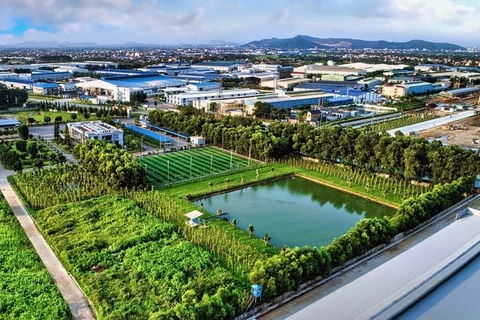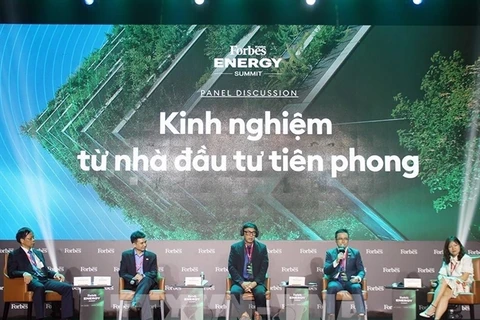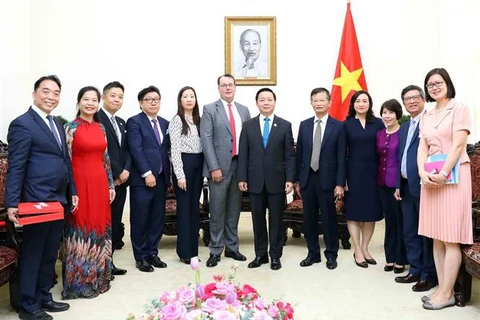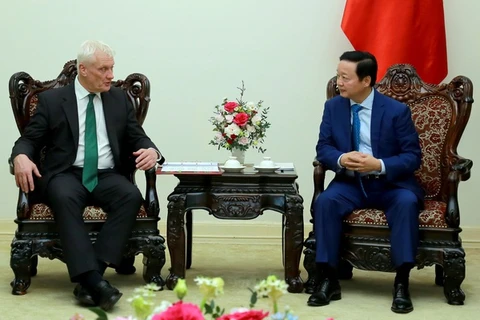Hanoi (VNA) - Relevant authorities need to have preferential policies regarding prices and tax rates, and those providing support for investors in accessing loans for renewable energy projects, said insiders.
Renewable energy plays a crucial role and is an essential requirement for sustainable development. However, in recent years, after the boom in solar and wind power, many clean energy projects have almost come to a standstill.
According to Nguyen Viet Dung, Vice Chairman of the Board of Directors of Halcom Vietnam, it is also necessary to soon perfect the legal framework, including guiding documents for implementing the National Power Development Plan VIII (PDP8), incentive mechanisms, direct power purchase and sale contracts for projects, so that investors can have a basis for calculation and investment preparation.
Policies for renewable energy development are not really clear, especially in negotiations of electricity purchase and sale contracts, and electricity selling prices, Dung said.
He added that there are no documents and regulations guiding the implementation of renewable energy projects after the approval of PDP8; and at the same time, preferential policies are currently not attractive to foreign investors.
Nguyen Anh Tuan from the Vietnam Energy Association said there are three significant challenges that impact the energy transition in Vietnam, including future electricity pricing, demand for load balancing, and building green hydrogen strategy.
The legal framework has allowed all economic sectors to invest in the transmission grid, but there are no legal documents guiding the implementation, Tuan said.
He underlined the need to study and issue a detailed Renewable Energy Law soon, focusing regulations on promoting Vietnam's energy transition in the near future.
Supporting mechanisms and policies must be detailed in the law to ensure stable and long-term support for sustainable and reasonable energy transition in the country, he said.
The Government's supportive mechanisms and policies in recent times have led to a remarkable leap in the development of renewable energy in Vietnam, said insiders.
From having a negligible capacity in 2018, renewable energy sources now account for about 30% of the total capacity in the national power system.
According to international recommendations, countries that pursue low-carbon development strategies will have more opportunities to access resources for economic development in the 21st century.
Experts said that Vietnam’s mechanisms to encourage the development of renewable energy have not yet shown a long-term orientation, and many policies remain inadequate.
Financial institutions and commercial banks often hesitate to provide loans for renewable energy projects due to the high capital requirements and risks involved.
Energy expert Nguyen Van Vy said that the renewable energy market needs clear policies and legal procedures to attract more attention from investors./.
Renewable energy plays a crucial role and is an essential requirement for sustainable development. However, in recent years, after the boom in solar and wind power, many clean energy projects have almost come to a standstill.
According to Nguyen Viet Dung, Vice Chairman of the Board of Directors of Halcom Vietnam, it is also necessary to soon perfect the legal framework, including guiding documents for implementing the National Power Development Plan VIII (PDP8), incentive mechanisms, direct power purchase and sale contracts for projects, so that investors can have a basis for calculation and investment preparation.
Policies for renewable energy development are not really clear, especially in negotiations of electricity purchase and sale contracts, and electricity selling prices, Dung said.
He added that there are no documents and regulations guiding the implementation of renewable energy projects after the approval of PDP8; and at the same time, preferential policies are currently not attractive to foreign investors.
Nguyen Anh Tuan from the Vietnam Energy Association said there are three significant challenges that impact the energy transition in Vietnam, including future electricity pricing, demand for load balancing, and building green hydrogen strategy.
The legal framework has allowed all economic sectors to invest in the transmission grid, but there are no legal documents guiding the implementation, Tuan said.
He underlined the need to study and issue a detailed Renewable Energy Law soon, focusing regulations on promoting Vietnam's energy transition in the near future.
Supporting mechanisms and policies must be detailed in the law to ensure stable and long-term support for sustainable and reasonable energy transition in the country, he said.
The Government's supportive mechanisms and policies in recent times have led to a remarkable leap in the development of renewable energy in Vietnam, said insiders.
From having a negligible capacity in 2018, renewable energy sources now account for about 30% of the total capacity in the national power system.
According to international recommendations, countries that pursue low-carbon development strategies will have more opportunities to access resources for economic development in the 21st century.
Experts said that Vietnam’s mechanisms to encourage the development of renewable energy have not yet shown a long-term orientation, and many policies remain inadequate.
Financial institutions and commercial banks often hesitate to provide loans for renewable energy projects due to the high capital requirements and risks involved.
Energy expert Nguyen Van Vy said that the renewable energy market needs clear policies and legal procedures to attract more attention from investors./.
VNA

























